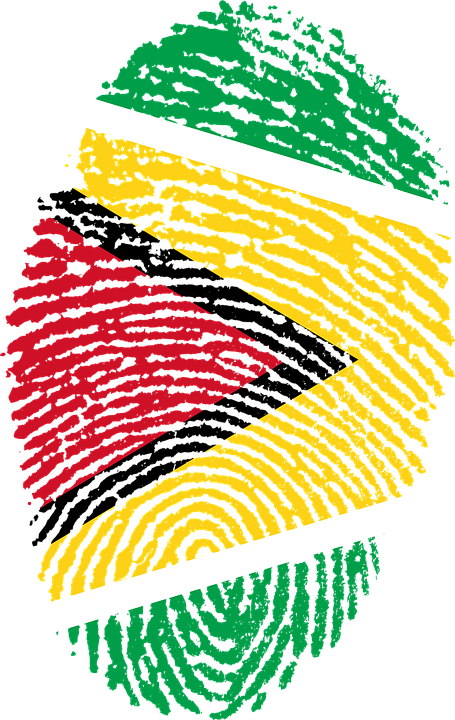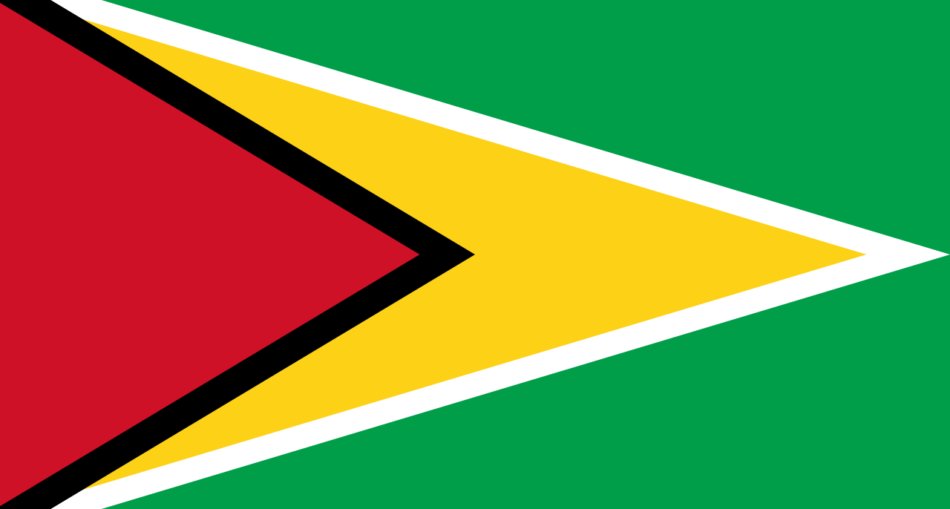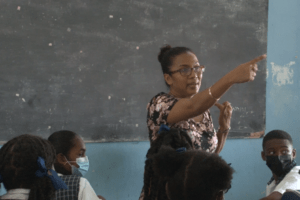An election is a formal and organized process of choosing a candidate for public office or another position. During the election, a candidate of a political party is either accepted or rejected by the act of voting. As many of you should know, Guyana was a former Dutch and British colony. This means Guyana was ruled under them and followed the respective systems and laws of these European countries, including the electoral systems they created and amended for Guyana. Like the culture of Guyana, these countries influenced the electoral system of Guyana. Read on and find out about the History of Elections in Guyana, its beginning, changes and influence on the country of Guyana.

Thumbprint – Image Source: https://pixabay.com/illustrations/guyana-flag-fingerprint-country-662106/
A History of Election in Guyana
Under the Dutch
The first election that was held in the then Guyana occurred in the eighteenth century when Essequibo, Demerara and Berbice were under the rule of the Dutch. In 1732, a Court of Policy was established that consisted of the five appointed officials, including the Fiscal Officer and Vendor Master, five colonists selected by the Governor from a list of nominees from the College of Keizers, an electoral college of Dutch planters, and the Governor himself. Together with the Court of Policy, the College of Kerizers formed the Combined Court.
During the Rule of the British
The British abolished the Court of Keizers when they took control of the then British Guiana in 1803. Financial representatives, elected by the public in six (6) constituencies took over the duties of the former Court of Keizers. Along with the Court of Policy, they formed the Combined Court. However, the College of Keizers was re-established in the 1830s, and its members were elected for life. When there was a vacancy, the College nominated two candidates on whom the Court of Policy would vote.
In 1891, the College of Keizers was abolished for the second time. This time it was because of constitutional reforms where direct elections to the Court of Policy was introduced, with an additional eight members to the former six. With an even number of appointed and elected members in the Combined Court, elections were now held under this system in the years of 1892, 1897, 1901, 1906, 1911, 1916, 1921 and 1926. The franchise remained small and limiting, with only eleven thousand and one hundred thirteen (11,103) people registered to vote from a population of 317,026 (3.5%) by the time of the 1926 elections.
A new constitution was implemented in 1928, leading to the abolition of the existing bodies and the establishment of the thirty (30) seat Legislative Council. This Legislative Council had fourteen (14) members elected in single-member constituencies but was now outnumbered by sixteen (16) appointees. Authorities were concerned with the Popular Party, that won most of the sears in 1926. Under this new system, elections were held in 1930 and 1930, however, due to World War II, it was delayed until 1947. By then, passed reforms reduced the appointed members to nine (9), allowing the elected members a majority on the Council.
The Legislative Council was replaced with the creation of the House of Assembly, a result of the Waddington Commission, made up to of Sir E.J. Waddington as Chairman and Dr. Rita Hinden and Professor Vincent Harlow. The new House had twenty-eight (28) members, twenty-four (24) of whom were members elected in single-member constituencies, a speaker (appointed by the Governor) and three ex officio members. The People’s Progressive Party (PPP) won in 1953 under this new system, taking eighteen (18) of twenty-four (24) seats. The leader of PPP, CHeddi Jagan started a series of policies involving radical social reform, directed at the British or colonial oligarchy. The British authorities felt threatened at the possibility of a Marxist revolution. Governor Alfred Savage suspended the constitution in October 1953 and set up a new, transitional government made up of politicians, businessmen and civil servants.
Interesting Tip
- An oligarchy is a small group of people having control of a country or organization.
- Marxists believe that the workers of the world must unite and free themselves from capitalist oppression to create a world run by and for the working class.
This transitional government lasted until the 1957 elections to a reconstituted Legislative Council with (fourteen) 14 elected members. The People’s Progressive Party won all except two (2) seats even though it was split in two, the PPP, led by Janet Jagan and the People’s National Congress led by Forbes Burnham, former member of the PPP party.
Another Constitution reform in 1961, created the Legislature, which consisted of an elected thirty (36) member Legislature Assembly. The candidate which receives most valid votes wins the election.These elections were again won by the PPP, who took 20 of the 35 directly-elected seats, receiving only one point six percent of votes (1.6%). This caused mass demonstrations led by the PNC, a general strike and severe inter-racial violence which stopped due to the intervention of British authorities.
Interesting Tip
- Former President Mr. Forbes Burnham was a former member of the PPP party who created the Afro-Guyanese-dominated People’s National Congress. This, whether unintentional, established an ethnic divide between the parties.
- Thirty-five (35) members of the Assembly are elected in single-member constituencies, whom all elect a Speaker, the thirty sixth (36th) member.
After these events, further constitution reforms were made to create the single legislative chamber fifty-four (54) member House of Assembly. the previously used electoral system First Past the Post system was replaced by the Proportional Representation electoral system. In the First Past the Post system of election, eligible voting citizens of the country cast their votes for their choice of candidate. In 1964, elections were held in Guyana, under this new Proportional Representation Electoral System. Here the PPP once again won the highest amount of votes, while PNC formed a coalition government with the United Force, holding twenty-nine (29) seats, the majority of seats.
This piece is extracted from an article-THE DECEMBER 7, 1964 ELECTION-from The Guyana Chronicle (7th December, 2009)
The PPP secured the most votes and it was the only Party that increased its percentage share of the votes over the 1961 election. However, the Governor violated British conventions that would allow Dr Cheddi Jagan to form the government as the leader of the Party with the majority of votes. Instead, the Governor, through a constitutional amendment, called on Mr. Burnham of the People’s National Congress (PNC) to establish a government with the assistance of The United Force (TUF), creating the short-lived PNC-TUF Coalition.
The December 7, 1964 date is strategic in that it represents the climax of international intrigue and betrayal to remove a popular government from office; notwithstanding its several electoral triumphs, through free, fair, and transparent elections right on from 1953. It is significant to note, too, that the PPP on more than a few occasions was the victim of ‘reduced terms in office’, culminating in aborted policy formulation and implementation, e.g., in the 1953, 1961, and 1997 terms.
After Independence
The House of Assembly was later renamed the National Assembly when Guyana gained Independence in 1966. The Proportional Representation Electoral System remained but the elections were allegedly rigged by the PNC who transferred responsibility for holding elections from the Electoral Commission to a government department. It is said unfair elections were held after, in the years 1968 and 1973. 1980 and 1985. In 1980, a new constitution caused another title the ‘Executive President’ to be created. This post is automatically assumed by the leader of the party which received the most votes.
Democratic reforms were introduced in the late 1990s, on the demands from Western countries and international organization and after being postponed for several times, free and fair elections were held in 1992. After this election Jagan returned to power after a twenty-eight (28) year hiatus. His party, the PP won again in 1997. Some changes were made to the electoral system in 2001 like the single fifty-three 53-member nationwide constituency was replaced by a forty (40) member nationwide constituency. Ten (10) multi-member constituencies based on the country’s regions, which together elected another twenty-five (25) members. Elections in 2001 saw yet another PPP victory, and again in 2006.
In 2011 the PPP claimed another victory but failed to achieve a majority of seats, only getting a number of thirty-two (32) seats. A Partnership for National Unity (APNU) was created to contest the 2011 General Elections, and made up the opposition. In 2015, APNU and Alliance for Change (AFC) created a coalition and won the election, allowing David Granger to become President of Guyana.
Interesting Tip
- Guyana achieved status as an independent self-governing state in the year 1961 with a name change from British Guiana to the current, Guyana.
- The then Head of Government was called the Premier and this person was assisted by a Cabinet of Ministers. Together, only they had authority over internal matters.
- During this period, Britain kept some responsibilities for some governing of Guyana like the Foreign Affairs and Defence.
- APNU is made up of several parties, including Burnham’s PNC, the Guyana Action Party, the Guyana Association of Local Authorities, the Guyana National Congress, the Guyana People’s Partnership, the Guyana Youth Congress, the Justice for All Party, the National Democratic Front, the National Front Alliance, and the Working People’s Alliance.
About Elections in Guyana
Elections in Guyana have been held since the year 1732 under the Dutch. Guyana passed on from the ruling of the Dutch, and British who had their individual ways and laws of governing a country. Guyana as changed tremendously after much influence under these first world countries and no doubt, our electoral systems underwent changes that we see few relations to the earliest Dutch’s electoral system and may not even recognize it from then. Guyana’s electoral system started with Dutch’s and then British Combined Court which had several changes made to it, once even being abolished. Elections were held under this system until late 1926 and was replaced by the Legislative Council, which itself, was replaced by the House of Assembly. The First Past the Post System no longer functioned as Guyana’s electoral system but was replaced by the Proportional Representation system, under which Guyana’s elections are held to date.
Article References
- http://www.caribbeanelections.com/eDocs/manifestos/gy/apnu_manifesto_2011.pdf
- https://www.britannica.com/topic/election-political-science
- https://www.gecom.org.gy/archived/guyana.html
- http://guyanachronicle.com/2009/12/07/the-december-7-1964-election
- https://en.wikipedia.org/wiki/First-past-the-post_voting
- https://www.electoral-reform.org.uk/voting-systems/types-of-voting-system/first-past-the-post/
- https://en.wikipedia.org/wiki/Forbes_Burnham
- http://www.guyana.org/features/guyanastory/chapter175.html
- https://en.wikipedia.org/wiki/A_Partnership_for_National_Unity
- http://www.caribbeanelections.com/eDocs/manifestos/gy/apnu_manifesto_2011.pdf








1 Comment